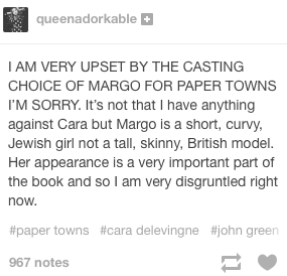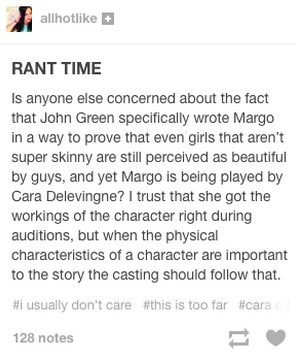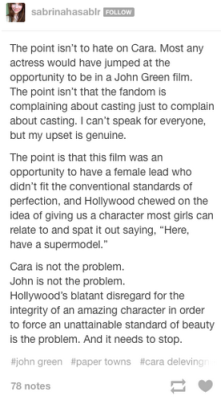The women in John Green’s novels are intelligent and inspirational. In his stories, which embody the struggles of growing up in such a beautiful way, his female characters transcend their physical appearance. And this is why the casting of Cara Delevingne to play Margo in “Paper Towns” is so difficult to understand.
“Paper Towns,” one of Green’s novels, is to be released as a film in 2015. The story is about a young man named Quentin (Q for short) Jacobson who has a crush on his neighbor, Margo Roth Spiegelman, an intelligent, mysterious girl who runs away from home. In the novel, Margo is described as curvy, or as Q put it, “you could not say that Margo Roth Spiegelman was fat, or that she was skinny.”
On September 16 it was announced that super model Cara Delevingne was cast to play the role of Margo. Cara is tall and thin — essentially the antithesis of how Margo was described in the book. Additionally, as she is already very well-known, her own fanbase will be interested in “Paper Towns” and not necessarily for Green’s work. On the day the casting announcement was made, Green, who will be executive producer for the film, Tweeted:

It is clear that Green saw something within Delevingne that correlated with his perspective of Margo’s character. Because he is the writer of the novel, I want so badly to trust his judgment, but I just can’t bring myself to. As an ardent fan of Green’s work, I feel a sense of belonging within the world Green creates in his novels. With my vision of this world changing into something else, it’s almost as if I’m excluded from the stories where I once found such comfort. When Shailene Woodley played Hazel in “The Fault in Our Stars,” the first of Green’s novels to be adapted to the screen, she looked like an average, relatable teenage girl. Her looks were not a focal point of the story, and I was able to disassociate Woodley as a person from the character she played. But since Cara is a well-known model, her looks might distract from the meaning of the story and it might be more difficult to truly see her as Margo.
In “Paper Towns,” Q romanticized Margo. He didn’t fully understand her on any deeper, more intimate level. Everything he knew about her was either from their childhood together or by observing her from a distance. It was through tracking her down after she runs away that he gets to see a glimpse of who she really is. This illustrates the deeper message behind the book, which is to not judge someone based on how they appear on the surface. Some might say that judging Delevigne solely on her looks contradicts the moral of the story. Maybe she does “understand Margo profoundly,” as Green stated.
When mainstream media is already saturated with images of tall, slender women, I don’t think it’s too much to ask to want to see different body types represented, especially the ones Green wrote about himself.
It’s true that Delevingne isn’t the conventional beauty, with her thick eyebrows and unique bone structure, but she still has a trendy look that fits into America’s standard of beauty quite nicely — skinny, young and white.
Green’s novels have touched me a great deal, as they have to thousands of other readers. They embody the struggles of growing up in such a beautiful way. The characters are intelligent and profound, yet still relatable. I want the films to have the same impact. They should star young women who don’t adhere to the mainstream beauty standards, yet are still fascinating, charismatic and lovable. The fact that Margo is clever and unique on top of being curvy is important in the story.
As Green’s novels are aimed at young adults who are just coming of age, I believe it’s necessary to show aspirational women of different sizes. This is needed to erase the stigma that women must adhere to a certain archetypal beauty in order to be accepted and successful in life. Other fans of Green’s novels have taken to social media platforms like Tumblr to express similar sentiments:



It’s a strange experience to see a book you adore appear on a screen in someone else’s vision — even if the author is involved in the moviemaking process. Fans of books feel a sense of attachment to their favorite novels, and this is something that is hard to let go of. If a book-turned-movie is portrayed wrong, it might change the way one reads that book forever. For avid readers, this is a big deal. In light of that, the producers and directors of the film should do their best to stay as true to the book as possible, in each and every way.
“Looking for Alaska,” Green’s debut novel, is my all-time favorite book. I relate to the character Alaska unlike any other fictional person. The book is rumored to be the next Green novel turned into a film. I should be excited, but the casting for “Paper Towns” has me nervous.
Born and raised in New York City, Rafaella (Raffi) is majoring in Journalism + Design at Lang. Rafaella also enjoys fashion, writing poetry, reading for pleasure, the art of drag, and listening to pop-punk!








Leave a Reply